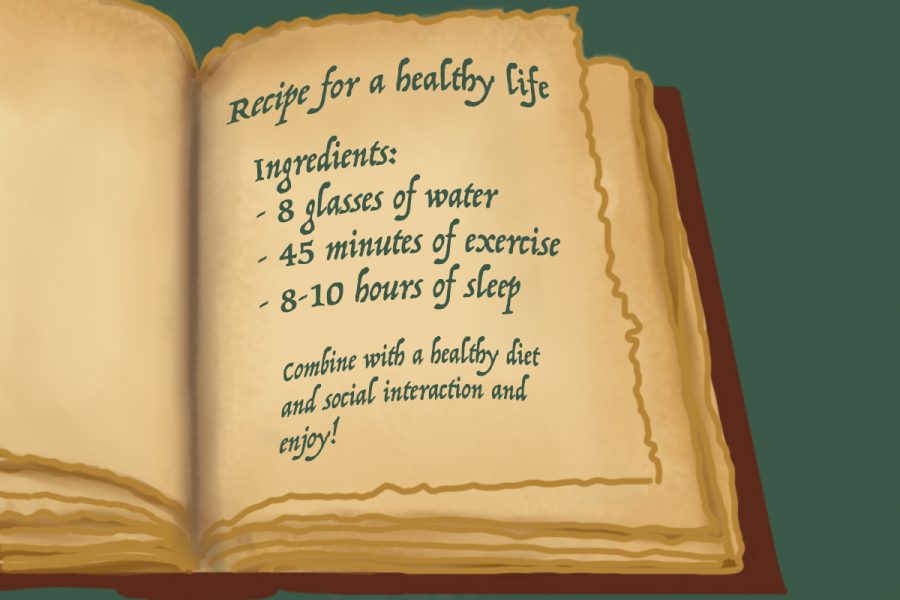Blanche’s guide to a happy, healthy life
In today’s fast-paced world, many people forget the importance of a healthy diet, consistent sleep schedule, social interaction and sufficient exercise. The Sidekick social media manager Blanche Harris discusses the need for each of these factors in maintaining a healthy lifestyle.
May 13, 2021
What are the most common ways to slide a meaningless comment in a conversation? How about, “I’m tired,” “my neck hurts,” “my skin looks awful.” These are the things everyone seems to constantly battle. Never enough sleep. Always too much junk food. Constant craning over a computer screen.
So let’s fix that. Consider me your Sidekick personal trainer. There are three core areas of our health, and by examining the best ways to approach each one, we can develop a healthier mindset about our bodies and minds.
Diet
Nowadays, diets are extreme solutions that need to be balanced out. Fitness influencers have hopped online to give advice and share diets that they swear by. Diets are presented as one-size-fits-all when the key to dieting is how well you customize them to your body. Individuality is key. According to the Lindner Center of Hope, “Aggressive dieting lowers the base metabolic rate, meaning one burns less energy when resting.” When dieting, think to yourself, would I rather have a healthy month or a healthy life? Are you really helping your body, or just temporarily removing your bloat? In some cases, depending on the person, dieting can help your body.
Focus on the long term. How do you want to have a relationship with food?
“It’s healthiest to have a well balanced diet,” Coppell assistant football Christopher Lackey said. “[You need] carbs, proteins, unsaturated fats. A good general rule is to have smaller meals throughout the day and not a lot of simple carbs and sugars. Moderation is key.”
In addition to moderation, a successful diet is based on self-control. Fight the urge to binge on food whenever you are experiencing cravings. Diets have to be viewed as a way of life, not a restrictive, negative component. When you start to think of a diet as a pathway of freedom – the freedom to choose to eat well and stay in moderation – you unlock the secret of successful dieting.
Exercise
My view on exercise is fairly simple. Go outside and move for at least 30 minutes a day.
“Be very consistent with exercise,” CHS senior Annelise Holguin said. “Record what you have done so that you can see improvement and create a routine. It helps regulate my sleep schedule and helps it all to fit together.”
Make sure that every day you have an allotted amount of time to unwind and move.
Find what works for you, but make it consistent. If you hate the gym, go on a bike ride. If you hate cardio, practice less intense cardio and more heavy weights. I try to look at my workouts as a fun way to move my body, so I incorporate music or a sport in while I do it. Often, I walk for miles listening to a podcast, play basketball with my brother or even yoga at night.
Sleep
Sleep is the most undersold advantage to our health. We already know that eating healthy and exercising often is good for us, but do we truly understand sleep? I recently read Matthew Walker’s book Why We Sleep: Unlocking the power of sleep and dreams. Walker writes about the power of sleep and how we grossly underestimate its effects on us: Routinely sleeping less than six hours a night weakens your immune system, substantially increasing your risk of certain forms of cancer.
Humans have not been receiving a good amount of quality sleep. The increased phone usage in the past decade makes it hard for our internal body clock to function properly. When we are on our devices late into the night, the blue light emitted from the screens keeps us awake when we should be asleep.
“It is difficult to imagine any other state—natural or medically manipulated—that affords a more powerful redressing of physical and mental health at every level of analysis,” Walker writes.
If you are now frantically worrying about the quantity and quality of your sleep, take a breath. First, make a clean break from your electronic devices at least one hour before sleep. When you use devices right before bed, the light it emits keeps you awake long into the night. Second, maintain any routine you create. You cannot expect to have good quality sleep after four days of following a routine and then quitting. Make sure to stay on your routine and eventually, you can feel a drastic change in your body. Sleep is crucial to your health, in every way. The purpose of sleep is to allow our minds rest and a space to process what has happened during the day. When we consistently follow a healthy sleep routine, your skin can clear, you can be more productive and in a better mood.
This may seem like a lot, but break it down step by step. Focus on one thing at a time and maintain consistency doing so. Take the time to have a well balanced diet, enough sleep and spend time outside. If you can create a routine where you follow this trifecta of health, you will reap the blessings you sow.











